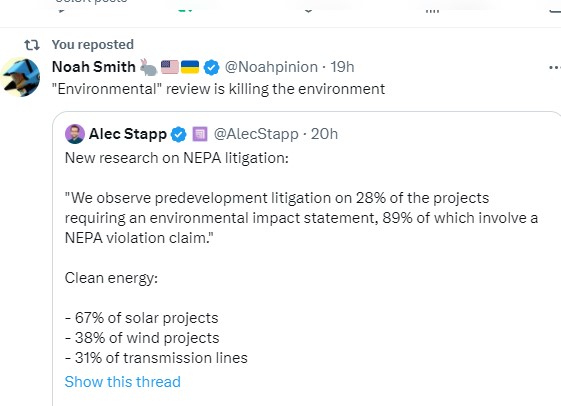I am struggling with thoughts about status quo bias. I see many issues where a proposal to do something new is subject to severe scrutiny which is not applied to the implicit proposal to keep doing what we have been doing. The logic is small c conservative — better to stick with what we know than to take a chance. In many critically important cases, this makes no sense, as we are not in a steady state and things won’t stay the same (being what we know) no matter what we do. I will now try to focus (for this post only — maybe many follow). One trigger was this Tweet Notably if a firm wishes to continue to burn coal in an existing power plant it does Not have to file an environmental impact statement and there can be no litigation involving
Topics:
Robert Waldmann considers the following as important: climate change, Taxes/regulation, US EConomics, US/Global Economics
This could be interesting, too:
NewDealdemocrat writes JOLTS revisions from Yesterday’s Report
Bill Haskell writes The North American Automobile Industry Waits for Trump and the Gov. to Act
Bill Haskell writes Families Struggle Paying for Child Care While Working
Joel Eissenberg writes Time for Senate Dems to stand up against Trump/Musk
I am struggling with thoughts about status quo bias. I see many issues where a proposal to do something new is subject to severe scrutiny which is not applied to the implicit proposal to keep doing what we have been doing. The logic is small c conservative — better to stick with what we know than to take a chance. In many critically important cases, this makes no sense, as we are not in a steady state and things won’t stay the same (being what we know) no matter what we do.
I will now try to focus (for this post only — maybe many follow).
One trigger was this Tweet

Notably if a firm wishes to continue to burn coal in an existing power plant it does Not have to file an environmental impact statement and there can be no litigation involving NEPA violation claims. The law subjects new construction to severe review, but does not subject existing plants to such review.
This makes sense if sticking with the old plant were at least safe. However, we know it is deadly dangerous. The idea (back in the 70s when NEPA was written) seems to be that we should stick with what we have until we are confident that something new is an improvement.
This idea makes no sense at all. We can’t stick with what we have. We have to choose whether to stick with the current CO2 concentrations or to stick with business as usual. We are currently changing the atmosphere. The apparently small c conservative position is to keep the rate of change about the same (until the planet becomes uninhabitable and the problem is solved).
Now first of all, there is a specific problem related to energy and global warming. I don’t know how much solar, wind and transmission can be protected from NEPA by and executive order and how much would require legislation (how would Congress vote on pro green energy deregulation ? Beats me).
But I think there is a general problem of assuming that current business as usual is OK so we should stick with it whille considering whether to take a risk on something new. I think people often think that way when there isn’t an option to keep things as they are while we gather information, think, and consider. There will be many posts (many of which may be boring) in this series.
